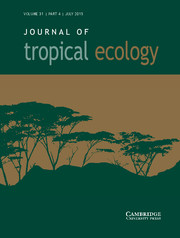Crossref Citations
This article has been cited by the following publications. This list is generated based on data provided by
Crossref.
Eichhorn, Markus P.
Fagan, K. C.
Compton, Stephen G.
Dent, Daisy H.
and
Hartley, Sue E.
2007.
Explaining Leaf Herbivory Rates on Tree Seedlings in a Malaysian Rain Forest.
Biotropica,
Vol. 39,
Issue. 3,
p.
416.
Lopez-Toledo, Leonel
Martínez, Mariana
van Breugel, Michiel
and
Sterck, Frank J.
2008.
Soil and light effects on the sapling performance of the shade-tolerant speciesBrosimum alicastrum(Moraceae) in a Mexican tropical rain forest.
Journal of Tropical Ecology,
Vol. 24,
Issue. 6,
p.
629.
Eichhorn, Markus P.
Compton, Stephen G.
and
Hartley, Sue E.
2008.
The Influence of Soil Type on Rain Forest Insect Herbivore Communities.
Biotropica,
Vol. 40,
Issue. 6,
p.
707.
Dent, Daisy H.
and
Burslem, David F. R. P.
2009.
Performance Trade‐offs Driven by Morphological Plasticity Contribute to Habitat Specialization of Bornean Tree Species.
Biotropica,
Vol. 41,
Issue. 4,
p.
424.
Tanaka, Hiroshi O.
Inui, Yoko
and
Itioka, Takao
2009.
Anti‐herbivore effects of an ant species,Crematogaster difformis, inhabiting myrmecophytic epiphytes in the canopy of a tropical lowland rainforest in Borneo.
Ecological Research,
Vol. 24,
Issue. 6,
p.
1393.
Eichhorn, Markus P.
Nilus, Reuben
Compton, Stephen G.
Hartley, Sue E.
and
Burslem, David F. R. P.
2010.
Herbivory of tropical rain forest tree seedlings correlates with future mortality.
Ecology,
Vol. 91,
Issue. 4,
p.
1092.
Schuldt, Andreas
Baruffol, Martin
Böhnke, Martin
Bruelheide, Helge
Härdtle, Werner
Lang, Anne C.
Nadrowski, Karin
Von Oheimb, Goddert
Voigt, Winfried
Zhou, Hongzhang
and
Assmann, Thorsten
2010.
Tree diversity promotes insect herbivory in subtropical forests of south‐east China.
Journal of Ecology,
Vol. 98,
Issue. 4,
p.
917.
Fine, Paul V. A.
and
Mesones, Italo
2011.
The Role of Natural Enemies in the Germination and Establishment of Pachira (Malvaceae) Trees in the Peruvian Amazon.
Biotropica,
Vol. 43,
Issue. 3,
p.
265.
Sinimbu, G.
Coley, P. D.
Lemes, M. R.
Lokvam, J.
and
Kursar, T. A.
2012.
Do the antiherbivore traits of expanding leaves in the Neotropical tree Inga paraensis (Fabaceae) vary with light availability?.
Oecologia,
Vol. 170,
Issue. 3,
p.
669.
Paine, C. E. Timothy
Stenflo, Martin
Philipson, Christopher D.
Saner, Philippe
Bagchi, Robert
Ong, Robert C.
and
Hector, Andy
2012.
Differential growth responses in seedlings of ten species of Dipterocarpaceae to experimental shading and defoliation.
Journal of Tropical Ecology,
Vol. 28,
Issue. 4,
p.
377.
Norghauer, Julian M.
and
Newbery, David M.
2013.
Herbivores equalize the seedling height growth of three dominant tree species in an African tropical rain forest.
Forest Ecology and Management,
Vol. 310,
Issue. ,
p.
555.
De Carvalho Guimarães, Carla Daniele
Viana, João Paulo Rodrigues
and
Cornelissen, Tatiana
2014.
A Meta-Analysis of the Effects of Fragmentation on Herbivorous Insects.
Environmental Entomology,
Vol. 43,
Issue. 3,
p.
537.
Kelly, Colleen K.
Bowler, Michael G.
Fox, Gordon A.
Solís-Magallanes, J. Arturo
Ramos-Tapia, J. Marcela
Blair, Pilar Lopera
Schwinning, Susanne
Williams, John N.
and
Joy, Jeffrey B.
2014.
Temporal Dynamics and Ecological Process.
p.
41.
2014.
Temporal Dynamics and Ecological Process.
p.
9.
Cárate-Tandalla, Daisy
Leuschner, Christoph
and
Homeier, Jürgen
2015.
Performance of Seedlings of a Shade-Tolerant Tropical Tree Species after Moderate Addition of N and P.
Frontiers in Earth Science,
Vol. 3,
Issue. ,
Waddell, Emily H.
Chapman, Daniel S.
Hill, Jane K.
Hughes, Mark
Sailim, Azlin Bin
Tangah, Joseph
and
Banin, Lindsay F.
2023.
Evidence of biotic resistance to exotic plant invasion in degraded Bornean forests.
Biotropica,
Vol. 55,
Issue. 4,
p.
767.




